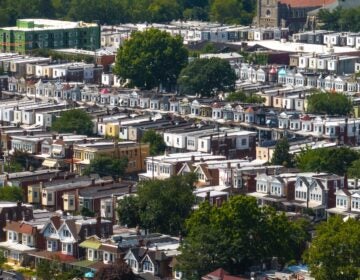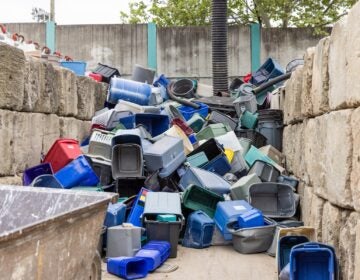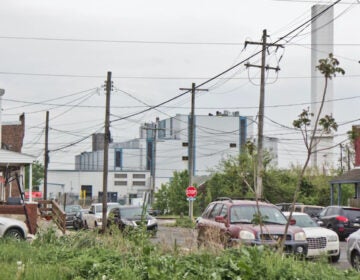New report details pandemic impact on Philly housing and homelessness
CARES Act funds kept more people off the street, but also led to some renters struggling through lapses in housing inspections.
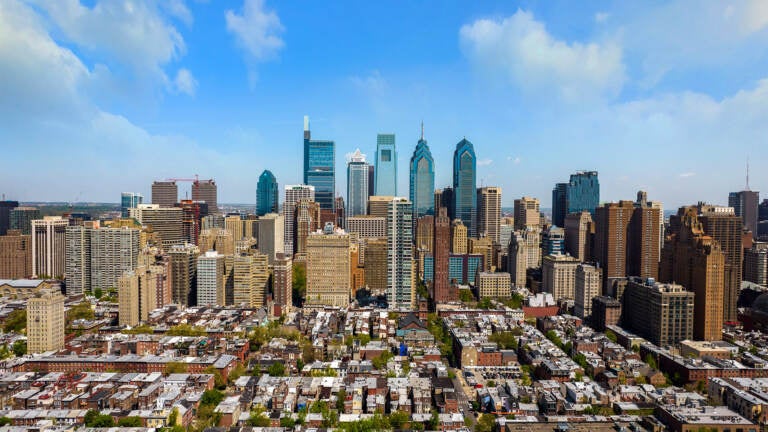
The Philadelphia skyline. (Mark Henninger/Imagic Digital)
Got a question about Philly’s neighborhoods or the systems that shape them? PlanPhilly reporters want to hear from you! Ask us a question or send us a story idea you think we should cover.
A new annual report from the Philadelphia Department of Public Health provides a snapshot of city life during the first several months of the pandemic, highlighting the impact of COVID-19 on housing, as well as a variety of health outcomes.
The 2021 Health of the City report shows Philadelphia recorded fewer housing code violations in 2020 than in 2019.
In previous years, that fact may have been viewed as a small victory for tenant rights advocates. The city has used these violations, driven by complaints from renters, as a proxy for measuring housing quality.
But for part of 2020, the Department of Licenses and Inspections temporarily curtailed interior inspections of occupied rental properties due to COVID-19. Between mid-March and late April that year, as scientists were still learning about the virus, the department only sent out an inspector when a resident lodged what’s known as a “life safety complaint.” Having no heat is an example.
Though relatively brief, the temporary policy shift, which ended by early May of 2020, translated to a drop in housing code violations for the year — 109 housing code violations per 1,000 occupied units.
In 2019, the department recorded 194.7 violations per 1,000 occupied units.
City spokesperson Sarah Peterson said the decrease also reflects the fact that renters had the right, as they do now, to refuse entry to an enforcement inspector.
“And some residents did refuse entry even after they filed a complaint because they weren’t comfortable having an inspector in their home during the early days of the pandemic,” said Peterson.
But Osarugue Osa-Edoh, a supervising attorney at Community Legal Services, said the numbers also tell the story of residents who quietly suffered while living with less serious, but nonetheless detrimental, housing conditions like mold and pest infestation, a trigger for asthma.
“Tenants that I worked with were now seeing the negative effects on their health more at this time because they were at home more with these conditions,” said Osa-Edoh.
“It was definitely really tough. It almost felt like a no-end-in-sight situation,” she added.
While many renters struggled as a result of COVID-19, the pandemic had a positive impact on homelessness in Philadelphia, according to the city. Fewer people experienced homelessness in 2020 than in 2019.
Fewer people lived on the street. But there were also fewer people who spent time staying with friends or family because they had nowhere else to go.
In 2020, a total of 5,634 people experienced homelessness. In 2019, that figure was 5,735 people.
Liz Hersh, director of the city’s Office of Homeless Services, attributes the decrease to the federal funding for homelessness prevention that came to Philadelphia via the CARES Act, as well as the federal stimulus checks sent out to individuals.
The CARES money was used for homelessness prevention, shelters, outreach, and permanent housing. The stimulus checks helped people to get back on their feet,” said Hersh.
“One of the COVID silver linings was that there was additional money [for homelessness],” said Hersh, adding that the gains seen in 2020 continued in 2021.
Last year, a total of 4,302 people experienced homelessness.
The report also includes wide-ranging data on life expectancy, mental and behavioral health, tobacco use, and access to health care. Additionally, there is considerable data regarding COVID-19.
In 2020, overall life expectancy declined dramatically, with the life expectancy for males dipping to 68.6. It was 73 in 2019.
The life expectancy for females in Philadelphia in 2020 was 75.3, nearly five years younger than the previous year.
According to the report, the leading causes of death were heart disease, cancer, and COVID-19.
Homicide was ranked eighth in a year where the police department recorded 499 murders, then one shy of the all-time record.
Last year, the city shattered that record with 562 homicides.
 WHYY is one of over 20 news organizations producing Broke in Philly, a collaborative reporting project on solutions to poverty and the city’s push towards economic justice. Follow us at @BrokeInPhilly.
WHYY is one of over 20 news organizations producing Broke in Philly, a collaborative reporting project on solutions to poverty and the city’s push towards economic justice. Follow us at @BrokeInPhilly.

Subscribe to PlanPhilly
WHYY is your source for fact-based, in-depth journalism and information. As a nonprofit organization, we rely on financial support from readers like you. Please give today.




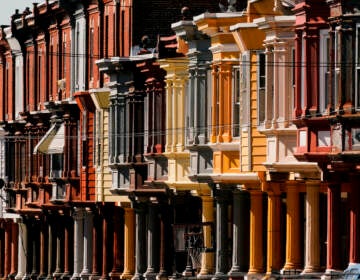


![CoronavirusPandemic_1024x512[1]](https://whyy.org/wp-content/uploads/2020/03/CoronavirusPandemic_1024x5121-300x150.jpg)
